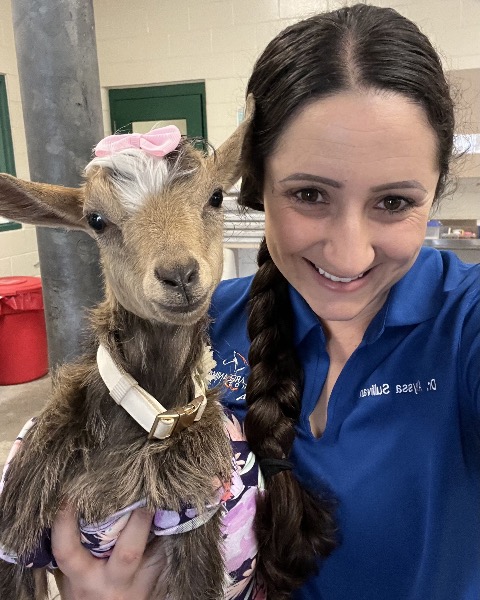Food Animal Internal Medicine
In Person Only
F03 - Twenty-four-hour Electrocardiographic Monitoring for Assessment of Cardiac Arrhythmias in Healthy and Hospitalized Goats
Wednesday, June 5, 2024
4:15pm - 4:30pm CT
Location: MCC 101 J
CE: 0.25

Alyssa Sullivan, DVM (she/her/hers)
Large Animal Internal Medicine Resident
University of Florida College of Veterinary Medicine
Gainesville, Florida, United States
Research Abstract - Oral Presenter(s)
Abstract:
Background: Information regarding caprine cardiology is limited. The clinical utility of continuous 24-hour electrocardiographic (ECG) recordings for detection of arrhythmias in hospitalized goats has not been reported. Hypothesis/
Objectives: 1) To determine the clinical feasibility of continuous 24-hour ECG monitoring in goats; 2) to report the frequency of arrhythmias in healthy goats and hospitalized medically ill goats.Animals: 11 healthy goats, 20 hospitalized medically ill goats
Methods: Prospective clinical study. Echocardiograms and continuous 24-hour ECG recordings were performed on all goats. Electrocardiograms were analyzed for rhythm diagnosis. Continuous data were assessed for normality using Shapiro-Wilk. χ2 was used for VPD comparison between groups.
Results: ECG monitors were well-tolerated in 30/31 goats, with no adverse effects. Twenty-eight were of sufficient quality for analysis with median readable time of 23 hours (range, 0 – 24 hours). All goats had structurally normal hearts. Eleven goats had ventricular arrhythmias (4 healthy, 7 medically ill), consisting of single ventricular premature depolarizations (VPDs) in 7 goats (3 healthy, 4 medically ill), VPDs and ventricular couplets in 2 goats (1 healthy, 1 medically ill), and nonsustained idioventricular/ventricular ectopic runs in 2 goats (2 medically ill). Median number of VPDs was 0 (range, 0 – 9) in healthy goats and 0 (range, 0 – 201) in medically ill goats (χ2, p=0.95).
Conclusion: The majority of goats tolerated 24-hour ECG monitoring well, although a few recordings were poor quality. Ventricular arrhythmias were seen in healthy and medically ill goats but idioventricular/ventricular runs were only seen in medically ill goats.
Background: Information regarding caprine cardiology is limited. The clinical utility of continuous 24-hour electrocardiographic (ECG) recordings for detection of arrhythmias in hospitalized goats has not been reported. Hypothesis/
Objectives: 1) To determine the clinical feasibility of continuous 24-hour ECG monitoring in goats; 2) to report the frequency of arrhythmias in healthy goats and hospitalized medically ill goats.Animals: 11 healthy goats, 20 hospitalized medically ill goats
Methods: Prospective clinical study. Echocardiograms and continuous 24-hour ECG recordings were performed on all goats. Electrocardiograms were analyzed for rhythm diagnosis. Continuous data were assessed for normality using Shapiro-Wilk. χ2 was used for VPD comparison between groups.
Results: ECG monitors were well-tolerated in 30/31 goats, with no adverse effects. Twenty-eight were of sufficient quality for analysis with median readable time of 23 hours (range, 0 – 24 hours). All goats had structurally normal hearts. Eleven goats had ventricular arrhythmias (4 healthy, 7 medically ill), consisting of single ventricular premature depolarizations (VPDs) in 7 goats (3 healthy, 4 medically ill), VPDs and ventricular couplets in 2 goats (1 healthy, 1 medically ill), and nonsustained idioventricular/ventricular ectopic runs in 2 goats (2 medically ill). Median number of VPDs was 0 (range, 0 – 9) in healthy goats and 0 (range, 0 – 201) in medically ill goats (χ2, p=0.95).
Conclusion: The majority of goats tolerated 24-hour ECG monitoring well, although a few recordings were poor quality. Ventricular arrhythmias were seen in healthy and medically ill goats but idioventricular/ventricular runs were only seen in medically ill goats.


